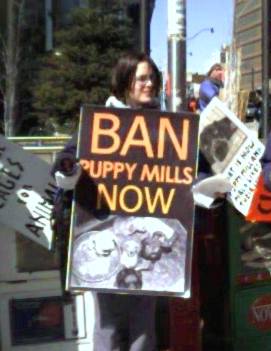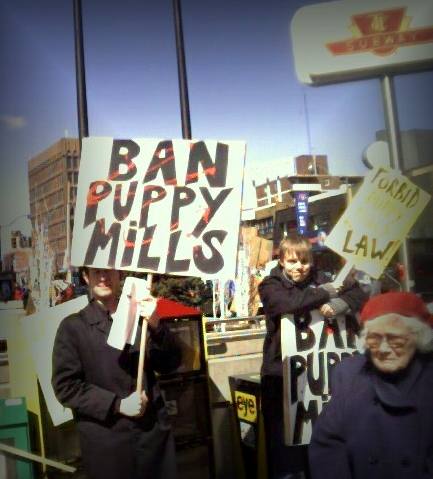|
back to Main Animal Rights Page
Puppy Mills and PJ’s Pets Protested - Sat. April 6, 2002 People from around Ontario gathered under the Freedom for Animals banner today to support animal rights and protest puppy mills and animal neglect. The colorful signs and banners demo took place at Yonge and Eglinton outside of PJs Pet Centre. It included two hours of picketing and leafleting. A number of dogs attended the rally, but they didn’t participate in the more dangerous aspect of the action … a march into the mall pet store. It led to chanting protesters being greeted by security guards and ordered to return to the sidewalk. Back in sunshine and a chilly spring day, protesters talked to members of the public and gathered signatures for a petition. PJ's Petstore at Yonge & Eglinton was raided recently. The outfit being charged with numerous counts of cruelty and failure to provide for the animals they sell out of their store in the mall. Digital Photos: Collage of Photos of Hamilton Protesters - from Jane Murphy
Ban Puppy Mills - Picketer
There are more than 400 puppy mills in Ontario and
they are considered to be cruel. SPCA investigators from Stratford, Midland
and Barrie rescued more than 50 dogs and four cats from a mill earlier
this month. The raid on the Baker's farm followed the rescue of 58 puppy-mill
dogs from a farm in Alliston and 16 more from a farm in Schomberg.
You Can Help Oppose Puppy Mills By
For more info on puppy mills visit: http://www.nopuppymillscanada.ca
* This report by Gary Morton for PJ the Cat’s page cat.htm at http://CitizensontheWeb.com --------
(Oct.9. 2001) From: stephanie_holliday@hotmail.com The truth that lies behind the eyes of "that doggy in the window" is actually a prevailing sadness. Pet stores are the largest consumers and distributors of puppy mill dogs, and Ontario is home to approximately four hundred of these operations. If you’re unfamiliar with the term, a puppy mill is defined as a breeding operation where dogs are repeatedly bred for financial gain while kept in substandard conditions. This definition can hardly prepare one for an actual glimpse behind closed doors. The noise of caged dogs is thunderous and the overwhelming smell of feces, repulsive. Dogs used as breeders never see the outside of the building or cages they are confined in. Chaos and crazed circling within cages is common, as are infections, open wounds and malnourishment. Mills range from large scale warehouses to tiny basement operations. The Society for the Prevention of Cruelty to Animals (SPCA) is the governing body of these unethical operations. Yet their powers are very limited. According to Dave Lake of the Hamilton SPCA, inspectors investigate premises based on complaints. If the owner/operator does not allow an inspector in, a warrant must be issued with information given under oath by a Justice of the Peace. (Section 12(2) of the Ontario Society for the Prevention of Cruelty to Animals Act gives authority for SPCA inspectors to enter premises without a warrant if they observe an animal in immediate distress). If evidence of abuse is found, the SPCA may than lay charges under the Federal Criminal Code of Canada. The maximum penalty under this code is a mere $2000 fine and/or six months in jail, or a two year ban on owning animals, creating breeders of puppy mills who are not easily discouraged. Toronto Liberal MPP Mike Colle is working to change these lax laws. As the Ontario Legislature just resumed seating, Colle introduced a Provincial private members bill to toughen up on puppy mills. The act will establish a Provincial registry and the licensing of all pet breeders and kennels. It will also allow the SPCA to search a property without a search warrant and to fine the owner/operator up to $50,000. Life-time bans may also be imposed on convicted puppy mill owner/operators and the SPCA will be able to fine pet stores that knowingly buy or sell pets from puppy mills. After speaking with Pierre Barnoti, the Executive Director of the Montreal SPCA, I have learned that a pet store may purchase a puppy from a puppy mill for about $100. Twenty-five will go to a broker (or middle man) and $75 to the mill itself. The store will then resell the puppy anywhere from $250.00 to $600.00. After calling almost every pet store who sells dogs in Hamilton, I realized the going price was about $250 to $700, which enables one to discern the connection between the price and the history of the dog. Mr. Barnoti also shed some light on the problem Quebec faces in regards to puppy mills. Since Quebec is the only province which has no animal cruelty laws, operators of puppy mills are rampant. Quebec has the largest number of puppy mills in Canada and is also a prime supplier to the rest of the country. There are an estimated 1,000 to 1,800 mills operating out of Quebec. While I strongly urge anyone reading this article to call your local MPP in support of Mike Colles’ Provincial private members bill, the support should not end there. If it does, what will likely end up happening is the displacement of puppy mill operators from Ontario to Quebec. In addition to strong Provincial legislation we also need a broadening of education on this topic. Why are puppy mills so rampant and successful? The main reason is consumers. A study completed by the Humane Society of the United States (HSUS) reveals that only 13% of people purchase a pet from a humane organization, ie: SPCA. Reputable breeders are scarce as economics’ often mandate legitimacy . Money received goes back into caring for the dogs, paying vet bills, purchasing quality blood lines, etc. This means that the vast majority of pets are coming from pet stores and/or newspaper ads. The public must take responsibility for this as we, the consumers, provide the market for the product. We are the cause of pet overpopulation. The HSUS study discloses that the number of abandoned animals in a city is seven per cent of that city’s population. With Hamilton’s population close to 500,000, this means that our city has about 35,000 stray dogs and cats. The Hamilton SPCA receives only 10 to 12 thousand animals per year. The adoption rate is not equal to the number of abandoned pets coming in. When an animal cannot be adopted out, the alternative is extermination. This is a direct consequence of the minute proportion of pet seekers who actually adopt from the SPCA. In order to support the SPCA and the animals they
protect, we have to start by purchasing our pets from them. We must stop
buying pets on the spur of the moment from pet stores and we must raise
our voice in support of MPP Mike Colles bill to end this abusive and unregulated
trade. Once we recognize this and accept that our decisions either aid
or tackle this industry, we can work together to implement nation wide
laws.
Stephanie Holliday
-------------------------------- |
 -
- 